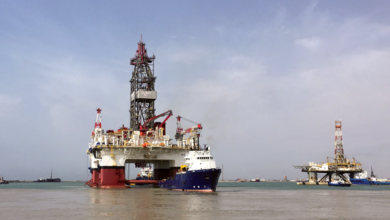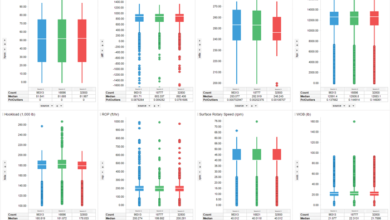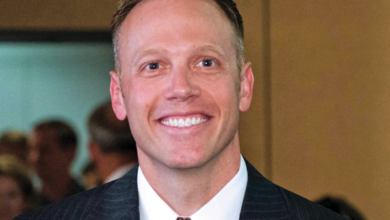2017 in review: IADC advances member interests through worldwide advocacy and engagement, accreditation programs, technical resources
By Amy Rose, IADC Director of External Relations
Advocacy
The Advocacy Division is responsible for advocacy activities and intervention on behalf of the drilling industry. The team proactively engages with US and global regulatory and legislative bodies, policymakers, oil and gas producers and the media to influence policies, provide input on standards making and pursue better regulation.
“This year was a busy one for our advocacy team members. Particularly in the US, with a new president and a new crop of House and Senate members, we served as an educative resource for new officials in the administration and congress,” said Elizabeth Craddock, IADC Vice President, Policy and Government Affairs.
“We are fortunate that these new officials see the value in our business, and we support their emphatic interest in advancing an energy-dominant agenda,” she continued. “We have seen some real wins for the energy industry this year with regard to repeal of policies and regulations that were decidedly not pro-energy or even pro-business. That work doesn’t happen without an effective advocacy program, and IADC members have remained involved with IADC’s advocacy arm to supply critical information.”
She added: “Next year will be equally as busy as we continue to look for more opportunities to educate decision makers worldwide on the importance of our industry and how we operate.”
In 2017, the Advocacy team published several reports on regulatory activities, including the semi-annual reports Federal Regulatory Actions Impacting Offshore Drilling and the International Standardization Activities Affecting the Oil and Gas Industry.
“Worldwide, there remains a need to represent the specific interests of drilling contractors when it comes to advocating for fair and transparent regulation and the development of standards that promote safety and overall commercial efficiency, not the proprietary interests of a few,” said Alan Spackman, IADC Vice President, Policy, Government and Regulatory Affairs.
He continued: “In addition to our global work with international bodies like the International Maritime Organization (IMO) and the International Organization for Standardization (ISO), IADC strives to represent its members’ interests in regional organizations, such as the European Commission and the EU Offshore Authorities Group, and as resources permit, at a national level with national regulatory bodies and trade associations. We always seek to have a voice and a seat at the table with the powerful groups that regulate and provide necessary guidance to and for our industry.”
Some of the high-profile projects and activities pursued during IADC’s Advocacy efforts in 2017 are discussed below.
Washington, DC, Fly-Ins
IADC’s Washington, DC-based staff hosted two legislative fly-ins this year – one for onshore members and one for offshore members. The fly-ins provided an opportunity to meet with members of Congress and their staffs to educate individuals creating laws affecting our industry. IADC also organized well-attended “lunch and learn” events for Capitol Hill staff during each of the fly-ins to provide information on how the oil and gas industry operates, the drilling contractor’s role in the industry and the economic benefits it provides. During the fly-ins, IADC members met with more than two dozen members of Congress.
In addition, IADC members met with Scott Pruitt, who was appointed as administrator of the US Environmental Protection Agency (EPA) early this year; Vincent DeVito, Energy Counselor to the Secretary of Interior; and officials within the Department of Labor’s Occupational Safety and Health Administration (OSHA).
Meetings with North Dakota Senator
In May, Houston-based IADC members were invited to attend a meet and greet with Sen. Heidi Heitkamp (D-ND). The meeting provided an opportunity for members to discuss issues of interest to the US oil and gas industry and provide the senator with the drilling industry’s perspective.
Revitalization of IADC’s PAC
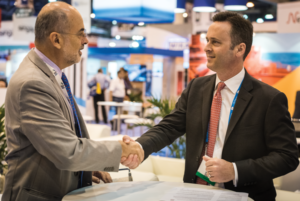
In 2017, the IADC Executive Committee unanimously agreed to restart the IADC political action committee (PAC). The PAC is run by a 10-member Board of Trustees, which includes three representatives from offshore, three from onshore and two from drilling services companies, along with two IADC representatives. The trustees decided on the name DRILLERSPAC. It will seek to support politicians who support the contract-drilling industry and share an energy-first viewpoint.
Post-Macondo Amendments to the MODU Code
Almost immediately after the Macondo-Deepwater Horizon incident, IADC began working with the US Coast Guard and the Republic of the Marshall Islands to assess the lessons learned from the event. Concluding these efforts in June 2017, the Maritime Safety Committee (MSC) of the IMO adopted amendments to the Code for the Construction and Equipment of Mobile Offshore Drilling Units, aimed at preventing and mitigating such incidents in the future. Changes include enhanced structural fire protection; power supply to dynamic positioning (DP) systems; electrical equipment in hazardous areas; drill floor firefighting systems; assumed body mass for lifeboat occupants; and designation of the master as “person in charge.” In work that also responded to the lessons learned from the tragedy, the MSC also adopted updated guidelines for vessels and units with DP systems.
US Regulatory Reform and Energy Independence
Upon assuming office, President Donald Trump issued a series of Executive Orders aimed at regulatory reform and promoting US energy independence. Key provisions of these orders required US Secretary of the Interior Ryan Zinke to “give full consideration” to revising the schedule of proposed Outer Continental Shelf (OCS) lease sales that had been put in place by the Obama administration and to complete a review or reconsideration of several Obama-era regulations that encumber the industry, including the BOP and Well Control Rule from the Bureau of Safety and Environmental Enforcement (BSEE).
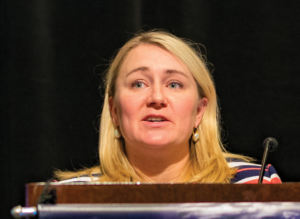
Joining with other trade groups, IADC rounded up more than 120 signatures from members of Congress in support of a new OCS Five-Year Leasing Plan, which would allow initial consideration of all 26 of the OCS planning areas. In all, four letters were sent to Secretary Zinke – a Senate letter with signatures from 36 senators, a House Republican letter, a House Democratic letter and a joint 15-page letter from industry associations. Besides IADC, other trade groups who participated were the API, the National Ocean Industries Association (NOIA), the Independent Petroleum Association of America (IPAA), US Oil & Gas Association (USOGA), American Exploration and Production Council, International Association of Geophysical Contractors, Petroleum Equipment and Services Association (PESA), and Alaska Oil and Gas Association. The letter supported keeping existing exploration production areas in the Gulf of Mexico (GOM) and Alaska available for leasing in the 2019-2024 Leasing Program and urged the Bureau of Ocean Energy Management (BOEM) to make new areas in the Atlantic, Eastern Gulf of Mexico, Beaufort and Chukchi Seas of Alaska, and the Pacific available for leasing as part of the program.
Having anticipated the opportunity to have the BOP & Well Control Rule reconsidered, the joint trade association team that had worked the Obama administration’s proposed rule refocused its efforts on identifying the provisions of that rule where the costs were disproportionate to the benefits to be achieved. In May, IADC joined API, IPAA, NOIA, the Offshore Operators Committee, PESA and the USOGA in sending the Department of Interior a 53-page letter describing the changes to the rule that the industry believes would be appropriate. These generally seek better alignment with post-Macondo industry standards.
Changes to North American Free Trade Agreement
In the interest of maintaining strong relationships with other international trade associations, IADC continued to work proactively with its sister trade groups on issues impacting the worldwide drilling industry. For example, in August, IADC participated in the Canada-US Energy Services Associations meeting in Washington, DC. Organized by the Petroleum Services Association of Canada and attended by the Canadian Association of Oilwell Drilling Contractors, the meeting offered an opportunity for attendees to discuss the North American Free Trade Agreement and possible changes to the agreement that could impact the energy industry in both countries.
Revocation and modification of Customs Rulings regarding classification of ‘vessel equipment’
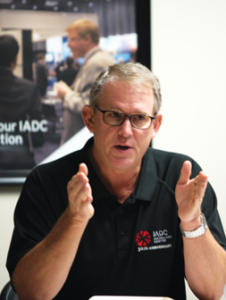
The Obama administration had left to the Trump administration a proposal by US Customs and Border Protection (CBP) to revoke or modify nearly 30 years of US Customs rulings regarding the classification of “vessel equipment.” To address this, IADC partnered with other industry associations to submit comments to CBP, along with a separate stand-alone comment letter. The CBP announced in May that it had withdrawn its proposed action.
Global advocacy efforts
Issues addressed by IADC in other parts of the world included:
• In the European Union:
o Developing a Best Available Techniques Guidance Document on Upstream Hydrocarbon Exploration and Production;
o Combatting the proposed extension of the Product Safety Directives to MODUs;
o Addressing liability, compensation and financial security for offshore oil and gas drilling operations;
• Expansion of the Danish tonnage tax regime to include MODUs;
• Addressing the complexities of transfer pricing and profit attribution guidance in relation to foreign resident vessels operating in Australia and cross-border asset leasing with the Australian Taxation Office;
• Informing India’s Commissioner of the Department of Revenue in its proposal to implement a unified Goods and Services Tax in India;
• Providing comments of India’s Parliamentary Standing Committee on proposed amendments to the Merchant Shipping Bill 2016 on extension of the requirements to obtain specified period licenses to non-propelled MODUs;
• Informing Indonesian authorities in their consideration of the extension of the cabotage legislation to MODUs;
• Informing worldwide stakeholders of IADC’s activities in developing cybersecurity guidelines for drilling operations;
• Participating in task groups developing/revising the following API standards:
o API RP 2CCU –– offshore containers;
o API RP 2D –– offshore cranes;
o API RP 2D-2 –– offshore cranes: training for operation and maintenance);
o API T 8 –– safety training for offshore workers;
o API STD 53 –– BOP equipment and systems;
o API STD 54 –– occupational safety for drilling;
o API RP 59 –– well control operations;
o API RP 75 –– safety management systems.
Operational Integrity
Under the direction of Mark Denkowski, Executive Vice President, Operational Integrity, the division worked to promote the interests of IADC members around the globe. Operational Integrity comprises the Onshore, Offshore, QA/QC, and Accreditation and Credentialing Divisions.
“In 2016, the operational integrity division worked closely with members and all of our stakeholders to ensure that our programs and ongoing initiatives accurately reflect the drilling industry’s critical needs,” Mr Denkowski commented. “Although US onshore operations have improved, 2017 was a tough year for the industry as a whole. During 2017, we were able to strengthen IADC WellSharp, Gateway, Drilling Industry Training and Crane-Rigger programs, as well as make valuable improvement to the RigPass and Competence Assurance programs. As we look forward into 2018 and beyond, we see opportunities where the strengths and expertise of the Operational Integrity group can positively impact our industry.”
Members of the division were active on a wide variety of industry workgroups to represent the interests of IADC members. These included attending National Institute for Occupational Safety and Health/National Occupational Research Agenda council meetings; OSHA Conference Committee meetings; Center for Offshore Safety committees and workshops; API subcommittees; Interstate Oil & Gas Compact Commission (IOGCC) meetings; International Association of Oil and Gas Producers (IOGP)/Wells Expert Committee task groups; STEPs meetings throughout the US; SafeLand and SafeGulf committees; Ocean Energy Safety Institute Advisory Panel; and contributing to IMO activities.
The Operational Integrity staff worked closely with IADC’s committees and workgroups to develop key industry deliverables. The accreditation staff continued to support the industry by participating and presenting at events such as PECOM, WellSharp workshops in Mexico and Australia, and API and OSHA events.
IOGP/IADC BOP Reliability JIP enters second phase
The JIP Oversight Committee continued collaboration with BSEE and the Bureau of Transportation Statistics (BTS) to ensure uniform data reporting under the Well Control Rule. Select JIP members also worked with BTS to assist in the preparation of its 2016 report. The JIP also switched its database to a new system. As a result, the database was branded as RAPID-S53, for Reliability and Performance Information Database for API Standard 53 well control equipment. The new system provides IADC with more control over general administration and users, as well as reduced operating costs.
Well Control Institute
The Well Control Institute (WCI) functions as an industry clearinghouse to study recent well control events and issue recommendations on how well control performance for the industry might be improved. The WCI Board of Directors consists of individuals at the highest levels among companies representing drilling contractors, operators, service companies and equipment manufacturers. In 2017, Lyndol Dew of Diamond Offshore Drilling was named Chairman of the WCI Board, and Steve Brady of Ensco and Eric Daflon of Total were named to contractor and operator Board positions. Also in 2017, the Competency workgroup submitted to the Board its first recommendations, which include gradual adoption of periodic refresher well control training.
WellSharp
In 2017, IADC introduced a number of updates to and expansions of WellSharp, IADC’s drilling well control training and assessment program. IADC accreditation staff, along with volunteer subject matter experts, updated the WellCAP Well Servicing/Intervention course curricula and will launch the modified WellSharp Well Servicing/Intervention course in early 2018, excluding introductory level. The updated Well Servicing/Intervention courses include snubbing, coiled tubing, wireline and workover and, for the first time, offered a subsea supplement, as well as a course specifically developed for the oil and gas operator representative.
WellSharp, introduced in 2015, is a rigorous well control training and assessment program that offers content on prevention, situational awareness, barriers, barrier management, and risk awareness and management. It encourages blended learning to enhance the quality and value of the training, with required independently proctored electronic knowledge assessments and enhanced simulator exercises, a format that has been well received.
Gateway
Gateway was developed by IADC accreditation staff in cooperation with the IADC Workforce Development Committee, which brought together industry partners and more than 50 institutions of higher learning to develop course curriculums. The result of this work is Gateway, which will eventually comprise a suite of specialized training programs. The Introduction to Oil and Gas is the first available course and aims to help companies connect with colleges, training providers and other organizations to attract, screen, hire, train and promote onshore and offshore oil and gas workers worldwide.
Crane-Rigger Accreditation
The Crane-Rigger Accreditation, which was developed by IADC accreditation staff in cooperation with the IADC Workforce Development Committee, aligns with and surpasses the API RP 2D standard. The program was launched in October 2016, and several training providers were accredited in 2017.
Incident Statistics Program (ISP)
The Incident Statistics Program (ISP) annual report compiles numbers that detail fatalities, lost-time incidents (LTIs) and recordables for drilling contractors who voluntarily participate in the program. For 2016, the drilling industry’s worldwide LTI rate was 0.13, and the recordable incident rate was 0.46. A total of nine fatalities were reported.
International Division
Under the leadership of Mike DuBose, Vice President, International Development, the International Development Division has stationed regional representatives to represent IADC throughout the world. Based in Europe, the UK, Brazil, the Middle East, Asia Pacific and Australasia, they attend IADC chapter meetings in their assigned areas and liaise with government officials and regulators to advocate on behalf of drilling contractor interests. Hisham Zebian joined IADC this year after the retirement of Dave Geer, with responsibility to serve the drilling industry in the Middle East and Africa.

“IADC’s regional representatives have local knowledge about the geographies they represent, giving them a unique perspective on how IADC can be an effective advocate for the drilling industry in different regions around the world,” Mr DuBose said. “This year, we had the opportunity to collaborate closely with our colleagues around the globe on some exciting projects that have had a positive impact for our industry. In 2018, we look forward to continuing this work and continuing to be one of the leading voices for the global drilling industry.”
The division was active on a variety of issues and participated in a number of workgroups over the course of 2017, and IADC international chapters were also active in working to address multiple challenges. The South Central Asia (India) Chapter hosted a well-attended and well-received Hand and Finger Injury Workshop in March. The North Sea Chapter produced two guidance documents in 2017 – “Guidance on Overside Working and Alternatives to Close Standby Cover” and “Oil Pollution Emergency Plan: Template for Non-Production Mobile Offshore Drilling Units” – and again hosted its annual Safety Awards Dinner to recognize leaders in safety in the region. IADC is also working with local industry leaders to restart the Caspian Chapter, which is expected to be revitalized by year-end 2017.
During OTC in May, IADC and the Brazilian Petroleum, Gas and Biofuels Institute (IBP) signed a memorandum of understanding that established a framework through which the organizations will cooperate and collaborate to foster education and communication within the upstream oil and gas industry in Brazil. Also during OTC, IADC, in conjunction with the Southeast Asia Chapter, hosted a dinner for the Indian delegation to facilitate networking.
IADC representatives attended the Australian Petroleum Production and Exploration Association Conference and Exhibition in Perth, Australia, in May. While there, they met with Derrick O’Keeffe, Head of the Safety and Integrity Division for the National Offshore Petroleum Safety and Environmental Management Authority, the Australian regulator.
The International Development group, working in conjunction with the IADC Conferences team, has also worked to establish the Latin America Critical Issues Conference, which will be hosted in Mexico City in October 2018. It will be the first IADC conference to be held in Mexico and will offer members and delegates an opportunity to learn first-hand about emerging markets in the region.
The International Development division also oversees the IADC Student Chapter program. The program, which aims to engage with students considering a career in the oil and gas industry, has so far awarded three universities with certificates of organization, recognizing them as official IADC Student Chapters. Texas A&M University, Missouri University of Science and Technology, and the University of Louisiana-Lafayette are currently operating student chapters on their campuses, with another three US universities interested in forming their own student chapters.
Drilling Services Division
The IADC Drilling Services Division is a working organization comprising four committees – Advanced Rig Technology (ART), Drilling Engineers, Technical Publications, and Underbalanced Operations and Managed Pressure Drilling (UBO & MPD). Mike Bowie, BHGE, served as IADC Vice President-Drilling Services in 2017.
ART COMMITTEE
The IADC ART Committee’s mission is to improve safety and efficiency through sound operating procedures, design of automated systems and standardizing automation. Led by Chairman Robin Macmillan, National Oilwell Varco, and Vice Chair Trenton Martin, Transocean, the committee’s Alarm Management Workgroup delivered in late 2016 “IADC Drilling Control System Alarm Management Guidelines.” These guidelines, available through the IADC Bookstore, provide an understanding of applicable standards, alarm philosophy, personnel responsibilities regarding drilling control system (DCS) alarms, types of alarms, real-time use of alarms, management of change and more. The guidelines are intended to assist system suppliers and drilling contractors in improving alarm treatment, as defined by job responsibility. The workgroup operated under the auspices of the IADC ART DCS Subcommittee, chaired by Nathan Moralez, BP. Vice Chairman is Robert van Kuilenburg, Noble Corp.
The ART BOP Controls Subcommittee, chaired by Roy Mills, Noble Corp, and co-chaired by Mitch Eichler, Parker Hannifin, is developing guidelines for SPM and shuttle valves. The guidelines were scheduled for completion by year-end. The guideline document aims to provide standardized qualification testing of SPM and shuttle valves. The guidelines will address design, testing parameters, operations, maintenance and record keeping.
ART also organized three Spark Tanks during 2017, with the third planned for 6 December. The ART Spark Tanks are forums where new and developing technologies (“sparks”) are presented to a panel of operators and contractors (“sharks”), who provide feedback to the presenter. The purpose is to provide technology developers with insights on what is important to their prospective customers. “There is sometimes a vast disconnect between a good idea and a great product, and the Spark Tanks attempt to close that gap in a good-natured, productive manner,” IADC Group Vice President/Publisher Mike Killalea said.
The Spark Tanks were launched by the ART Future Technology Subcommittee, chaired and co-chaired by Harris Reynolds, Diamond Offshore, and Bob Judge, BHGE.
Sharks who participated at the 5 April Spark Tank were Joey Husband, Nabors Industries; Paul J. King, Transocean; and Taylor Thetford, Apache Corp. Sharks at the 2 August event were Keith Lynch, ConocoPhillips; John Kozicz, Transocean; and Patrick O’Neill, Noble Corp.
The ART Committee also organized the 2017 Advanced Rig Technology Conference, held 24-25 October in Amsterdam.

Led by Chairwoman Siv Hilde Houmb, the Cybersecurity Subcommittee published the IADC Guidelines for Assessing and Managing Cybersecurity Risks to Drilling Assets and drafted the Guidelines for Minimum Cybersecurity Best Practices for Drilling Assets. The subcommittee continues development of an additional four documents that will focus on network segmentation; cybersecurity training; security monitoring and audit; and hardening of control systems.
In 2018, API and IADC drafted a joint paper on Cyber Risk Management for Industrial Control Systems in the Offshore and Onshore Oil and Natural Gas Industry to inform policymakers and regulators on cybersecurity. IADC also joined with API and IOGP on a joint paper to educate the EU Commission, Members of Parliament, EU member state national-level policy makers, the US Congress and the White House on oil and gas industry cybersecurity.
In August, IADC members participated in the Gulf of Mexico Cyber Exercise organized by BSEE. IADC is the only upstream member on the Oil and Natural Gas Subsector Coordinating Council (ONG SCC) and, throughout the year, IADC attended the group’s meetings and participated in educational sessions for the Department of Energy. In February, IADC joined the Oil and Natural Gas Information Sharing and Analysis Center, giving the association access to a shared pool of intelligence on cyber incidents, threats, vulnerabilities and associated responses.
DRILLING ENGINEERS COMMITTEE (DEC)
Led by Mr Lynch of ConocoPhillips as Chairman, the DEC hosts four technology forums each year, in addition to sponsoring joint industry projects. The four events for 2017 were:
• Well Life Cycle Design, 29 March, hosted by NOV;
• Making Data Actionable, 14 June, hosted by Halliburton;
• What does “Prepared for MPD” Mean?, 19 September, hosted by Weatherford;
• Extreme Drilling, 15 November, hosted by BHGE.
The DEC is also sponsoring three JIPs:
• DEC-1, Drilling Systems Automation (DSA) Roadmap: John de Wardt, De Wardt & Co Chief Researcher;
• DEC-2, Decision Support for Dynamic Barrier Management: Amar Ahluwalia, DNV-GL, Chief Researcher;
• DEC-3, Rho Ve Method Software Concept: Matthew Czerniak, Director, GCS Solutions.
TECHNICAL PUBLICATIONS COMMITTEE
Led by Chairman Leon Robinson, the members of the IADC Technical Publications Committee write books spanning a wide range of drilling technologies. Unlike most such books, however, these books are peer-reviewed by the committee and outside experts. Together, these books comprise the IADC Drilling Series. The series, when complete, will serve as a comprehensive set of books on critical topics in drilling.
UBO and MPD COMMITTEE
The IADC UBO and MPD Committee, chaired by Oscar Gabaldon, Blade Energy Partners, is an active group that has developed numerous guidelines that have been adopted by API.
This year, members of the committee worked on comments to API RP 92S and API 16RCD, and the HSE and Training Subcommittee drafted a curriculum for MPD training. The Riser Gas Subcommittee focused on issuing an addendum to the IADC Deepwater Well Control Guidelines with recommendations on how to manage riser gas issues.
Communications
In 2017, the IADC Communications Department kept its focus on bringing drilling and completions news to the industry through its flagship Drilling Contractor (DC) magazine, the DC website, 12 issues of eNews, and two virtual panel discussions (VPDs). “The Communications Department has continued to push ahead with a multitude of industry-leading print and digital products that connect IADC members with the newest market trends and technical innovations within the drilling industry,” Mr Killalea said.
DC kicked off the year with its Critical Issues in Drilling and Completion Q&A’s that discussed the continued offshore rig oversupply, leveraging data-driven solutions, the workforce challenge, and even the changing role of drilling contractors. Industry leaders who participated in this issue included Jeremy Thigpen, President and CEO of Transocean; Kim McHugh, General Manager of Drilling and Completions at Chevron; and Datuk Mohd Anuar Taib, Executive Vice President and CEO Upstream for Petronas.
Throughout the year, DC served as the channel for additional news that keep the drilling industry in the know. These include exclusive interviews with Mr Filho with Brazil’s IBP, and Décio Oddone, Director-General of Brazil’s oil regulator ANP. DC also received exclusive access to Noble Drilling’s launch of its new electric BOP, which was reported both online and in the May/June issue of DC.
In June, DC launched a VPD, “Examining Gateway, IADC’s Training Program for New Employees,” featuring Pamela Wakefield of Patterson-UTI Drilling; Linda Head from Lone Star College; and IADC’s Brooke Polk. In September, DC launched another VPD, “Drilling and Completions in the Permian Basin Today,” with panelists Rodney Littleton with Pioneer Natural Resources and John Willis with Occidental Oil and Gas. DC

